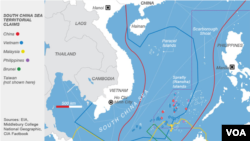Territorial claims have become a stressful issue in East and South East Asia over the past few years.
Conflicts over territory include the Spratly and Paracel islands in the South China Sea. Countries dispute ownership and China continues to expand its footprint.
President Barack Obama and Chinese President Xi Jinping spoke about the issue during Mr. Xi’s state visit to the United States. At a joint news conference, President Obama repeated his concerns about the maritime territory.
“We did have candid discussions on the East and South China Seas. I reiterated the right of all countries to freedom of navigation and overflight and to unimpeded commerce.”
Mr. Obama said he repeated concerns to Mr. Xi about land reclamation in the South China Sea. He said China’s action of filling in land in disputed island areas makes it hard to resolve dispute peacefully with neighbors.
President Xi defended China's claim to the area. He said China’s construction work on artificial islands in the South China Sea does not target any country. He also said that China "doesn't intend to pursue militarization."
China claims much of the South China Sea as its territory. However, Brunei, Malaysia, the Philippines, Taiwan and Vietnam also claim parts of western Pacific waters. Over the past 45 years, all these nations have reclaimed land in the South China Sea.
But their efforts are small compared to the 1,200 hectares reclaimed by China in the past 18 months.
The sea is important as a waterway for international trade. It is estimated that 40 percent of world trade passes through the South China Sea. Free navigation of its waters is highly important.
The sea is important for its resources, too. It contains important fisheries and is also believed to hold oil and natural gas reserves.
China has accessed a large share of these resources. It dominates the region economically and geographically. It has built military bases on islands in the sea that include docks and airstrips.
China is not alone in building an airstrip on islands in the sea. But its runways are large enough for military aircraft. This has worried its neighbors and the U.S. that China wants to control this area. The U.S. has said it is committed to open and free shipping in the area.
Efforts by a group of Asian countries called ASEAN -- the Association of South East Asian Nations -- have not solved the issue. China is not a member of ASEAN. And the group is split.
Countries with claims in the South China Sea want to enforce a “code of conduct.” But countries without claims are unwilling to push for that requirement.
China's increased military spending
China’s military presence looms large in the area. The country’s military budget, officially at $145 billion, increased 10 percent in 2015. Many new weapons were on display at the recent World War II anniversary parade.
They included the Dongfeng 21-D missile, called the “carrier killer” by Chinese media. China has an aircraft carrier base on Hainan Island in the South China Sea.
In July, China accused the United States of militarizing the area because of U.S. surveillance patrols and joint military exercises with allies like the Philippines.
Changes to laws related to Japan’s Constitution
Japan’s constitution renounces war as a way to settle international disputes. On September 18, the Japanese government changed laws to its constitution that allows Japan’s Self-Defense Forces to fight outside the country with allies even if Japan is not under attack. The changes were passed by a coalition of Prime Minister Shinzo Abe’s Liberal Democratic Party and the Komeito party.
The changes caused large protests and sharp disagreement in Parliament. One public opinion study found that 54 percent opposed the bills while 29 percent supported updating the constitution.
Japan moves from pacifism
But Japan’s neighbors -- China and North and South Korea – were skeptical. Those countries have painful historical memories of Japanese occupation and colonization before World War Two.
China’s official People’s Daily Overseas Edition wrote that Prime Minister Abe had “brought huge uncertainty to the security situation in the Asia-Pacific region.”
Jeff Kingston is director of Asian Studies at Temple University in Tokyo. He said Prime Minister Abe has not helped the public understand the new bills.
China and Japan disagree over who owns islands in the Sea of Japan called Senkaku by Japan and Diaoyu by China. Neighboring South Korea also claims islands known as Dokdo in Korea and Takeshima in Japan.
I’m Mario Ritter.
Mario Ritter wrote this report for VOA Learning English. Kathleen Struck was the editor.
_______________________________________________________________
Words in This Story
candid –adj. expressing opinions and feelings in an honest and sincere way
unimpeded –adj. not slowed, delayed or blocked
skeptical –adj. having or expressing doubt about something







